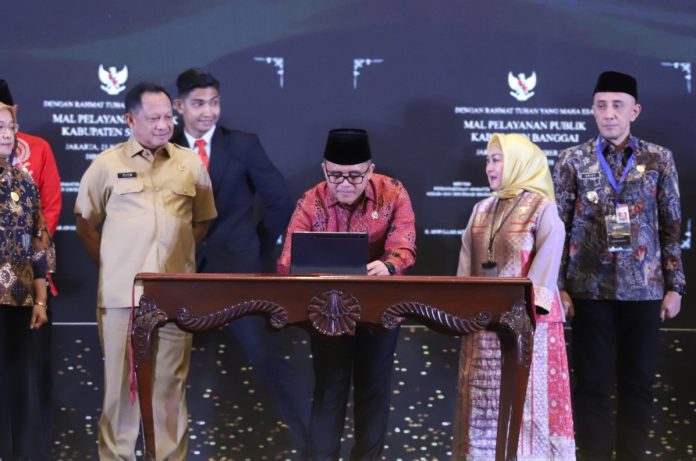JAKARTA – The number of Public Service Malls (PSMs) has increased by 12 with the joint inauguration by Minister of Administrative and Bureaucratic Reform Abdullah Azwar Anas yesterday, Tuesday (21/11).
A total of 12 districts and cities from 9 provinces officially have PSM, which is an integrated place for various services.
“The 12 districts and cities that have finally had PSMs are now ready to provide excellent services for their people. The presence of the PSM is expected not just to exist, but to be able to provide convenience for the community in accessing government services,” said Anas.
With the addition of the 12 PSMs that were inaugurated, there are a total of 175 PSMs spread throughout Indonesia.
This joint inauguration is an acceleration to bring PSM in all districts and cities in Indonesia, as directed by the Vice President who targets for all regions to have PSM by 2024.
Minister Anas said that the presence of PSM is one of the efforts in achieving the focus of thematic bureaucratic reform, namely improving the ease of doing business.
The logical framework for ease of doing business is designed to provide greater convenience for businesses.
This includes the availability of capable human resources, improvement and simplification of procedures, and optimisation of infrastructure that supports business activities.
“PSM has an important role to encourage the creation of an investment environment through an attractive ease of doing business for investment, promote economic growth, and stimulate sustainable business activities in each region,” the former Head of LKPP continued.
These twelve PSMs are known to be located in strategic locations in their respective regions. In fact, two of them are located in shopping centers.
Similar to other PSMs, these 12 PSMs are also equipped with various facilities and qualified infrastructure to provide convenience for the community in obtaining services.
Some of the facilities include a waiting room, lactation room, prayer room, reading corner, ATM center, children’s playground, and toilets.
There are also services for people with disabilities, such as special counters, wheelchairs, and ramps.
For service times, all PSMs are open from Monday to Friday, with the average service time starting at 8 am.
As for the end of service hours, some end at 3 pm and some are open until 4 pm local time.
In addition to encouraging the presence of PSM in each region, Minister Anas also said that the government is currently encouraging the presence of Digital PSM.
Thus, the public can easily get the services from anywhere and anytime through a mobile phone in their hand.
Digital PSM was built to accelerate the integration of electronic-based public services to support the implementation of physical PSM. Currently, there are 21 districts and cities that have piloted Digital PSM.
“I hope that the 12 PSMs inaugurated today can also prepare themselves in parallel to carry out digital transformation into Digital PSM. Thus, both physical PSM and Digital PSM can run continuously,” he explained.
“Once again congratulations on the inauguration. Hopefully, the presence of PSM can have a direct impact on the community,” Minister Anas concluded.
The 12 Public Service Malls inaugurated on Tuesday (21/11)
- Bengkalis Regency, 291 types of services from 47 institutions
- Lubuklinggau City, 135 types of services from 24 institutions
- Muara Enim Regency, 303 types of services from 24 institutions
- Tangerang Regency, 29 types of services from 9 institutions
- Magelang Regency, 144 types of services from 23 institutions
- Jember Regency, 238 types of services from 20 institutions
- Bangkalan Regency, 105 types of services from 13 institutions
- Pamekasan Regency, 102 types of services from 25 institutions
- Sintang Regency ‐ Bumi Senentang PSM, 107 types of services from 18 institutions
- Kabupaten Banggai Regency – Kalesang PSM, 28 types of services from 14 institutions
- Kabupaten Polewali Mandar Regency – Anjungan Izin Masagena PSM, 134 types of services from 17 institutions
- Ngada Regency, 60 types of services from 21 institutions




